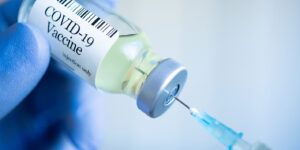As I sit outdoors on a beautiful, sunny spring afternoon, listening to Hamilton while I write this blog, the future is looking brighter both literally and figuratively. I am so grateful that much progress has been made thus far in our fight against Covid-19, and I think it is safe to say that thank God, our current circumstances are better than they were one short (yet seemingly very long) year ago. For example, I didn’t have to resort to cutting/accidentally butchering my bangs before Passover this year, because I was able to once again return to my hair salon. (You may have noticed that I had a different hairdo than my usual signature bangs in several of my Pelvic Pearls YouTube videos. The pulled back headband look was inspired by that experiment gone awry. Secret’s out!)
Joking aside and obviously more importantly, we now have two viable vaccines available. While I respect anyone who chooses to refrain from receiving the vaccine at present for whatever reason, I am a fully vaccinated, strong proponent who is grateful for this incredible development. Fortunately, approximately 20% of the country has been fully vaccinated with many more pending. New York has now offered vaccinations for anyone over the age of thirty regardless of one’s profession, and the Pfizer vaccine has been approved for teenagers aged 16-19.
Until recently, very few studies have focused on the effects of the vaccine on pregnant women as it was feared to be unsafe. Sadly, over 80,000 pregnant women have been infected with Covid-19, and 88 have passed away in the United States. In addition, this demographic is more likely to exhibit severe symptoms, to need intensive care admission, and to require a ventilator compared to their non-pregnant counterparts.
Fortunately, a recently approved and conducted NIH study revealed that Covid-19 vaccination during pregnancy resulted in improved maternal and fetal immunity. The presence of antibodies in both breast milk and the placenta indicated that vaccination during pregnancy confers immunity to the developing fetus. Furthermore, the vaccinated study participants exhibited higher antibody levels than women who naturally had antibodies during pregnancy due to actual infection. It is interesting to note that antibody levels were higher in women who received vaccination earlier in their pregnancy. The side effects were similar in both the pregnant and non-pregnant groups.
While individual consultation with one’s own ob/gyn is warranted and encouraged, it is nice to be able to share these positive findings. May we continue to share additional good news and to experience more promising developments.
Reference:
Gray KJ, et al. COVID-19 vaccine response in pregnant and lactating women: a cohort study. American Journal of Obstetrics and Gynecology. 2021.



